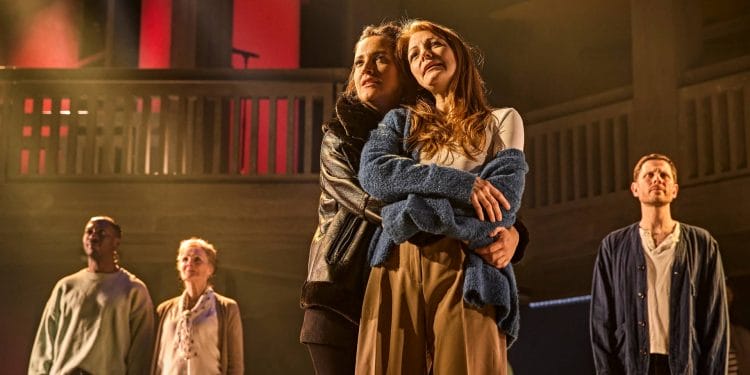 Sheffield Crucible scores another West End transfer with another new British musical, though this isn’t the first London outing for Standing at the Sky’s Edge which had a run at the National Theatre last year. Now at the Gillian Lynne Theatre, this story of class struggles with an incredible soundtrack is sure to delight audiences all over again.
Sheffield Crucible scores another West End transfer with another new British musical, though this isn’t the first London outing for Standing at the Sky’s Edge which had a run at the National Theatre last year. Now at the Gillian Lynne Theatre, this story of class struggles with an incredible soundtrack is sure to delight audiences all over again.
Set in Sheffield’s Park Hill, the brutalist council estate which is now Europe’s largest listed building, Standing at the Sky’s Edge gives us the intertwining stories of three families across three generations who all occupied one of the 990 flats that makes up Park Hill.
Harry and Rose move in to their new home in 1960, lifted out of the slums into ‘luxurious’ accommodation and with a life full of promise in the booming steel industry. By 1989, Park Hill has become little more than the slum it replaced, and we meet Joy, a Liberian refugee who is the next inhabitant of the flat. By 2015, Park Hill has been gentrified (after the previous tenants were thrown out) and the infamous ‘I Love You Will U Marry Me’ graffiti has been replaced with a neon sign. So, it’s the turn of Poppy, escaping a bad break-up in London to live in the North with Ocado deliveries and aubergine orecchiette.
The music from Richard Hawley (of Pulp fame) comes from his 2012 studio album, so in some senses this is a jukebox musical. With the script written around the music, the songs often fit neatly into the story, but more often they capture a sense or a feeling, and that’s probably why so many of them are performed microphone in hand, more like a gig than musical theatre.
The music ranges from anarchy rousing anthems to heartfelt ballads, but they all sound equally as good. The title number is goosebump inducing, especially because of the way it has been staged, but numbers like ‘There’s a Storm A-Comin’ and ‘Open Up Your Door’ also stay with you long after. The most surprising number of the night is ‘Midnight Train’ thanks to the absolutely gorgeous way it is performed by Samuel Jordan.
Chris Bush’s script is packed with the intricacies of these people’s lives, and how they are affected by the political and societal shifts that are occurring around them. In each generation there is an election which brings disappointment, most notably in the first timeline in which Harry (in a splendid performance from Joel-Harper Jackson) loses his job in the decimation of the steel industry by Margaret Thatcher. In the latest timeline Poppy (Laura Pitt-Pulford) is afforded luxuries none of the others could have dreamt of but faces redundancy because of Brexit.
As you would expect from something set in the North of England, it is the women who are the stronger characters, when Harry’s life crumbles it is Rose (Rachael Wooding) who transitions from sixties housewife to pragmatist. In Joy (Elizabeth Ayodele) we see a determination to better her life, but also give back something to the community that has given her a new home.
Despite all this, and a near three hour running time, the characters remain thinly drawn, and we don’t get to know them nearly enough. This means that when the big moments come in the second act, they don’t land the emotional punch that they should. The estate agent/narrator also feels a bit much and there’s too much reliance on tell over show.
Ben Stone’s set is a wonderfully enormous representation of the Park Hill estate, with the ‘sky streets’, underpasses and stairwells all fantastically represented. The onstage band have taken up residence in a duplex on the second and third floors, and again this feels like a fusion of gig and theatre. With such a large cast, it falls to choreographer Lynne Page to ensure everyone is doing something, and the repetitive motifs create a real sense of a community going about daily life.
Standing at the Sky’s Edge is undeniably a sensational new British musical, it has all the right ingredients, and the authority with which to speak about the impact of decades of government policies on cities like Sheffield, and by extension, the country as a whole.

















